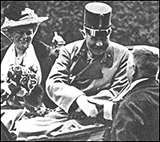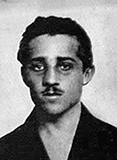One hundred years ago this month, the world's most costly and deadly war of its time was set in motion. The event that would lead to so much death, destruction and completely alter the 20th Century began in the European city of Sarajevo where one, somewhat important, man would be murdered.
The Seeds of War
Throughout the late 1800's and early 1900's Europe was on the edge of war. Lines were being drawn and alliances were forming. Nationalism was sweeping across the continent, threatening to end the great empires that had dominated for hundreds of years. Expansion or imperialism was on the rise in Africa and Asia, further increasing tension between the European powers. This time period is often referred to as the "Scramble for Africa" because so many European countries were racing to Africa to acquire land. Several factors, like the burgeoning need for resources drove Europe's imperialistic appetite, but the most powerful force was merely competition. Human nature shows us that there is a natural drive for competition or to keep up with those around us. Think of a neighbor or relative acquiring a new car. The immediate thought is, "I need a new car too." The monarchs of Europe felt the same way about colonialism. When a neighboring country acquired a new territory, it seemed necessary to acquire more land for oneself. This was done to ensure the "balance of power," but also to simply keep up and appear as powerful and prestigious as other countries.
As European nations came to compete and expand, it became necessary to ensure they each had a strong military. Conscription was the order of the day for many European nations, forcing millions of young men into a peacetime military. Now in the industrial age, factories were put to work mass producing deadly military hardware. Competition and fear drove the European powers of Great Britain, France, Germany, Austria-Hungary, Russia and others into an arms race. This militarism would push the nations of Europe to begin forming alliances... alliances they hoped would prevent war.
The Assassination
On June 28, 1914 a young Bosnian Serb named Gavrilo Princip was visiting Sarajevo. He had come with some of his co-conspirators, not to sightsee, but to make a political statement by assassinating the Archduke of Austria-Hungary, Franz Ferdinand. Princip was a nationalist and believed all Serbians should live together in one nation. Sarajevo (Bosnia) and numerous other areas governed by the Austro-Hungarian Empire contained Serbian peoples. The Black Hand was a Serbian nationalist group (with ties to the Serbian Army) that planned to unite all Serbians and Southern Slavic peoples under a single flag. Princip had tried to join the Black Hand, but was rejected for being too small. Bothered, but undeterred, he joined another group known as Young Bosnia, which also had ties to the Black Hand. After being "trained," he and his co-conspirators were smuggled into Bosnia where they prepared and planned the assassination.
The assassination began with a failed attempt to bomb the Archduke's car as he passed by in a motorcade. One bomb did detonate and injured several people, including those in the car behind the Archduke's. The motorcade sped up and the other assassins would miss their chance to murder Franz Ferdinand.
After giving his speech at the Town Hall, the Archduke began what would be his final journey. Princip's chance to kill came when the Archduke's car stopped on the street in front of him. The archduke was on his way to the local hospital to visit his friends injured in the bombing earlier that day and his driver was unsure of the proper route. Princip took his chance and shot the Archduke and his wife, Sophie. Both died within minutes.
"The political union of the Yugoslavs [..] was my basic idea [..] I am a Yugoslav nationalist, aiming for the unification of all Yugoslavs, and I do not care what form of state, but it must be free from Austria"
-Gavrilo Princip during his trial
The Great War Begins
By killing the Archduke, the assassins (and the Black Hand) hoped to spark a war between Austria-Hungary and Serbia, with Russia backing the latter. Their hope was to unite Southern Slavs into a unified state through conflict. The plan would not work. Austria blamed all of Serbia, not just the Black Hand or Young Bosnia, for the assassination. A harsh and unjust ultimatum was issued and Serbia refused to cooperate. Exactly one month later, on July 28, 1914 World War I officially began when Austria-Hungary declared war on Serbia. The alliances that had been growing for many years suddenly kicked in. Within weeks, numerous nations had declared war and the Great War had begun.
-WD
Related Lesson Plans
- Primary Source: The Assassination
- Edsitement!- Imperialism and the Open Door
- PBS- WWI: Beginnings & Progression
- Assassination of Franz Ferdinand
- BBC- Video Lesson on Causes
- Terrorism Lesson
Further Reading
- Young Indy Featured Documentary- Powder Keg--Europe 1900 to 1914
- Young Indy Featured Documentary- The Archduke's Last Journey--End of an Era
- First World War.com: Archduke Bio
- UK National Archives- Causes Resources
- Sarajevo- June 28, 1914 (Breakdown of the events)
First Posted: 06/01/2014




